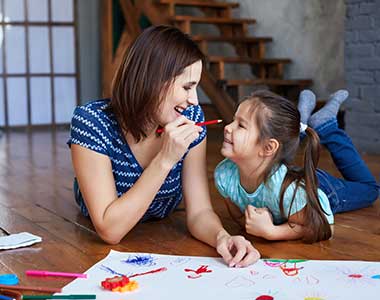How to Build Your Child’s Confidence

“Good girl,” we say when our little girl stacks a column of blocks.
“You’re a champ,” we tell our boy when he kicks a ball.
We may sometimes believe that complimenting our child will boost their self-esteem. As it turns out, there are better ways for children to develop confidence than hearing indiscriminate praise from their elders.
For children, confidence comes from feeling competent. The more children try new things and succeed, or fail and keep trying until they succeed, the more they develop a sense of their own potential. This takes time to build as they are still learning and exploring the world around them. Here are some of the things that we can do help them become happy, confident and self-assured.
1. Encourage practice to build competence
Children tend to get frustrated when they don’t see results. But by patiently encouraging them to keep at it, and acknowledging their efforts, we can instill in them the value of practice and persistence, and ultimately a sense of power over the outcome.
2. Be clear with compliments
Compliments are great, but not when they are exaggerated or untrue. For ex: telling a child he’s a star when his team lost a match. Instead, commend the effort and assert your confidence in his ability to play a good game.
3. Don’t rush in to rescue
We don’t want to see our child struggle or get hurt or discouraged so we make haste to intervene. But kids need to learn that it’s ok to fail, to make a mistake, to make a mess. They need to know it’s normal to have negative emotions, and that to succeed they need to overcome obstacles. By rushing to intervene, we deprive them of learning how to find solutions for themselves.
4. Include them in decision-making
When our toddler gets the chance to make choices from a young age, they’ll gain confidence in their own good judgment. Allow them to make age-appropriate choices ex: choosing her own clothes, deciding which bedtime book to read etc. Too many choices overwhelm children, so we should offer only 2-3 options at a time.
5. Teach optimism
If your child tends to feel defeated by disappointments, help her be see the glass as half full instead of half empty. Encourage her to think about specific ways to improve a situation and bring her closer to her goals.
6. Let him discover
Sometimes kids need a nudge or two as they try new things, ex: trying to eat with a spoon, completing a jigsaw puzzle. But we need to avoid stepping in to do it for them. They need to learn to find the way themselves with just minimal guidance from us.
7. Let them help around the house
Children need to know their contribution is valued and they need opportunities to demonstrate it. Allowing them to participate in age-appropriate chores gives them a sense of participation and an awareness of how to works as a team.
8. Love them unconditionally
This may seem like an obvious one, but nothing boosts their self-confidence than knowing that they are loved without reason or conditions. Knowing you have their back no matter what, allows them to feel secure and more confident about trying new things.













 Parenting Articles
Parenting Articles

